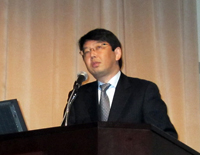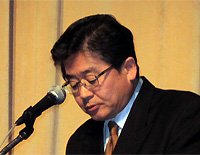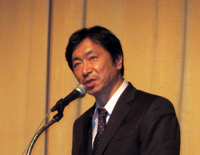"Seeking Compatibility between Economic Growth and Social Justice : Focusing on the Experiences of The New Brazil"
November 18, 2013, (Monday)
United Nations University U Thant International Conference Hall
Organizers: IDE-JETRO, The World Bank, The Asahi Shimbun Company
>>>>Event Guide/Program
Opening Remarks | Keynote Speech | Panel Discussion
Opening Remarks
Satoshi Miyamoto
(President, Japan External Trade Organization (JETRO))
Brazil was hit hard by the 1980s debt crisis. This was an era when annual inflation topped 1000%. The economy has since bounced back, though, and Brazil is now an emerging nation. Brazil is also attracting global attention for its efforts to realize social justice in amidst breakneck economic growth. However, this “New Brazil” still faces many problems, such as political turmoil and protest marches. It now seems Brazil is entering a new phase.
Japan invested a record-high $7.5 billion in Brazil in 2011 and Japanese firms show no signs of slowing down, with investment this year rising at an even faster pace that the year before. Within Brazil, a national project is underway to develop the country’s huge offshore pre-salt oilfields. Japanese firms are also supporting the project through the provision of ships or the construction of drilling platforms, for example. In May this year, JETRO launched the “SME Overseas Expansion Platform” in São Paulo to support the overseas business expansion of Japanese small- and medium-sized enterprises (SMEs). The platform provides in-depth, finely-tuned services, such as business matching with local firms. Furthermore, JETRO is also engaged in initiatives to explore new business opportunities across Brazil’. This includes the November 24-29 dispatch of a trade mission of U.S.-based Japanese firms and so on to Brazil’s north-eastern state of Bahia.
Awareness of Brazil is admittedly not that high in Japan, but this symposium will provide a valuable opportunity to learn about the New Brazil and will hopefully prompt a reconsideration of how to seek “compatibility between economic growth and social justice,” a pressing issue facing countries all over the world.

(President, Japan External Trade
Organization (JETRO))
Yasusuke Tsukagoshi
(Special Representative, Japan, The World Bank)
Compatibility between economic growth and social justice is a major theme of World Bank initiatives. Poverty is now declining compared to the past. Some people continue to live in extreme poverty, though, with one-third of these said to be children. Countries which have achieved growth, meanwhile, are now facing the problem of widening inequality. The World Bank has adopted 2 targets. We want to eradicate extreme poverty by 2030 and also promote shared prosperity. A multi-pronged approach is needed to tackle poverty; it cannot be alleviated by growth alone. The World Bank is pushing ahead with several reforms as it seeks to realize these goals. One involves working together with the private sector. Another involves the World Bank Group approaching the issues in a coordinated manner. The World Bank supports Brazil’s Bolsa Familia program and is promoting initiatives to transmit Brazil's experiences to other emerging economies. Versions of the program have now been introduced in 40 countries. We should learn from Brazil’s experiences and push forward with South-South cooperation.

(Special Representative, Japan,
The World Bank)
Hayami Ichikawa
(General Manager and Managing Editor of Tokyo Head Office, The Asahi Shimbun)
The Brazilian protest marches in June this year were featured prominently in the pages of our newspaper. The Brazilian Ppresident Dilma Rousseff’s trip to Japan also hit the news and garnered a lot of attention. Brazil, an emerging economy, is posting higher growth rates than Japan and it stands as a shining example to Japan’s stagnant economy. When Brazil’s citizens protested against inflation and for better education and healthcare, this perhaps reminded Japan of the difficulties of balancing economic growth with social justice. Since the Lehman Shock, the economic policies of Brazil and other emerging economies have helped alleviate the global slowdown and played the role of an engine for the global economy. Mr. Robert Zoellick has pointed out that unemployment rates are rising in several countries; we are now in an interlinked era when phenomena in one country can soon spread across the world. With the easing of monetary supply in Japan and the U.S., a huge amount of money has flooded into Brazil and other emerging economies. As a result, the currencies of these countries have been pushed upwards and the trend could end up causing problems. In other words, Brazil’s problems are in no way unrelated to what happens in Japan.

(General Manager and
Managing Editor of Tokyo Head Office,
The Asahi Shimbun)
Opening Remarks | Keynote Speech | Panel Discussion

